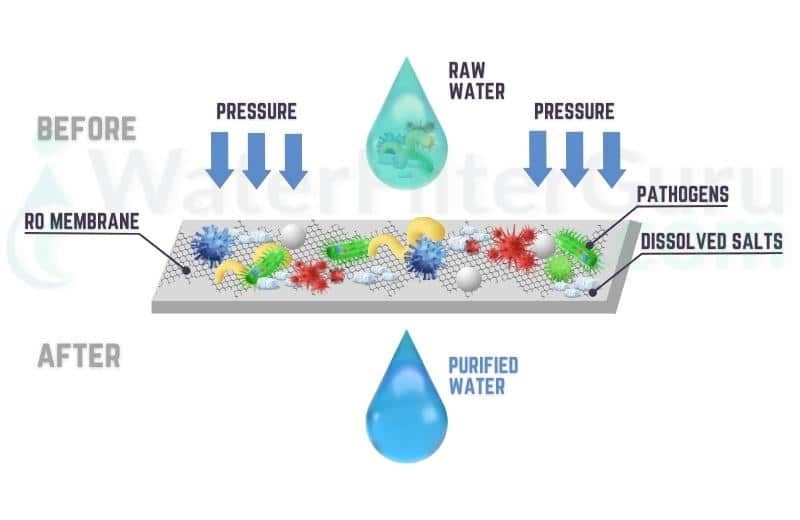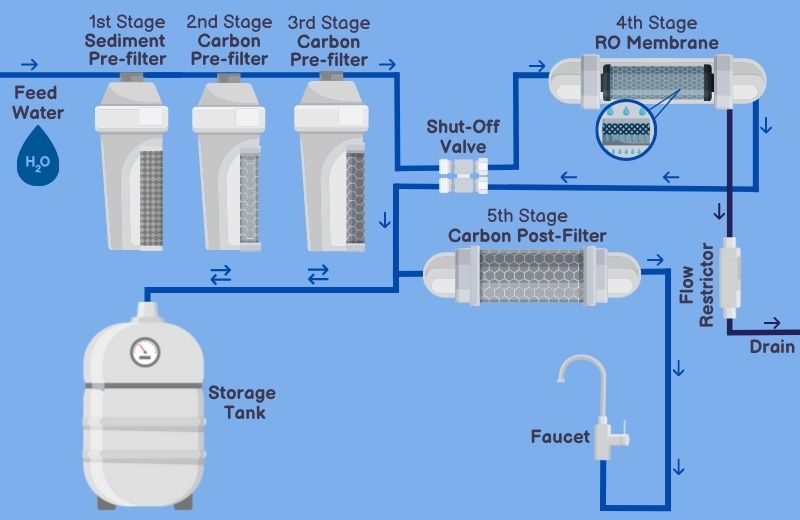If you’ve been considering investing in a reverse osmosis (RO) water filter for your home, you probably love everything about the sound of this system – apart from the fact that it wastes water.
Unfortunately, there’s no avoiding water waste in the reverse osmosis process. Although many RO systems are much more efficient than traditional systems, water waste can’t be eliminated entirely with this method of filtration.
So, why exactly does reverse osmosis waste water? How much water does reverse osmosis waste? And are there any ways to reduce the wastewater produced by an RO system? I’ve covered the answers to these questions, and more, in this guide.
Table of Contents
🌀 Why Does Reverse Osmosis Waste Water?
To understand why reverse osmosis wastes water, we need to know how the reverse osmosis filtration process works.
A standard, non-RO water filtration system contains several filter cartridges. Water flows through these cartridges, and contaminants are trapped in the filter pores.
RO systems work in a more complex manner. Many reverse osmosis systems use several filter cartridges, but the star of the show is the semi-permeable membrane. This membrane has tiny pores – much smaller than the pores on a standard cartridge filter – usually about 0.0005 microns.
Water is forced through this semi-permeable membrane. The composition of the tiny water particles enables them to pass through the membrane, but the impurities in water are too large, and are rejected by the membrane.

Without water waste, these contaminants would build up and up inside the RO chamber as water flowed through the system. With nowhere to go, the contaminants would simply bash against the membrane again and again.
Over time, the excessive number of contaminants trapped in the chamber would end up damaging the RO membrane.
How can this be prevented?
When the contaminants reverberate back into the RO chamber, they’re washed away down a drainpipe with a small amount of water. This happens at an ongoing rate during the RO process.
💦 How Much Water Does Reverse Osmosis Waste?
Traditionally, reverse osmosis would waste four gallons of water for every one gallon of pure water produced. We’ll look at the waste water ratio in more detail below.
RO water waste isn’t huge. You may notice that your water bill is a little higher than usual after installing an RO system, but if you only use the system for your drinking water, your water waste will be minimal.
Let’s say you have a family of four, and each of you drinks half a gallon of water (the recommended amount) per day. That’s 2 gallons in total, which means a traditional RO system would waste 8 gallons of drinking water per day to deliver your 2 gallons of purified drinking water.
However, there now are much better pure water to wastewater ratios in newer reverse osmosis systems, as you’ll learn below.
📤 Reverse Osmosis Water Waste Ratio
We know that the traditional water waste ratio for a reverse osmosis system is 1:4, meaning that 1 gallon of water produced, 4 gallons are wasted.
Thankfully, manufacturers have figured out how to make their reverse osmosis products more efficient, and it’s common to see wastewater ratios of: 1:2, 1:1, and even 2:1, meaning that 1 gallon of water is wasted for every 2 gallons of water produced.
🔎 How to Minimize RO System Waste Water
If you’re interested in reverse osmosis but you hate the idea of wasting a lot of water, there are ways to minimize water waste, even if you can’t prevent it entirely.
Use a Modern System
Firstly, avoid reverse osmosis systems with inefficient performances and look for those that don’t waste water unnecessarily.
A modern reverse osmosis system should have a much more efficient water waste ratio. Some systems achieve this by simply reducing the amount of water that leaves the RO chamber during filtration, while others are even more efficient, sending wastewater back around the system a second or third time to minimize how much water ends up down the drain.

Ensure Proper Water Pressure
Your water pressure can affect how much water is wasted in a reverse osmosis system.
Reverse osmosis systems require a good water pressure to force water through the semi-permeable membrane. If your water pressure isn’t strong enough, there won’t be enough force to push water through the membrane quickly. The longer it takes to filter water, the more water is wasted in the process.
Most reverse osmosis filters need a water pressure of at least 40 PSI to operate efficiently. If you don’t know your water pressure but you suspect it might be low, use a pressure gauge to see what you’re working with.
Low water pressure can be remedied using a booster pump, which allows you to adjust your water pressure to a more suitable flow.
Perform Regular System Maintenance
If you notice that your reverse osmosis system is wasting more water than usual, you probably need to replace the filters or the RO membrane.
Poorly-functioning filters or clogged membranes can increase water waste. Reverse osmosis systems require new membranes every 2 years, and new filters every 6-18 months, depending on the filter in question.

You want to make sure that water has the easiest time getting from A to B in your reverse osmosis filtered water system. When the filters are clogged or less efficient, they’ll slow down water flow, resulting in more wastewater – and worse water quality, too.
Recycle Discharge Water
There’s no law that says wasted reverse osmosis water has to go down your drain. Yes, this water contains contaminants, so you probably don’t want to drink it – that would defeat the purpose of using a reverse osmosis system. But this water is still technically safe to use as drinking water, so don’t rule it out for other purposes.
Instead of sending your discharge water into your drain, consider connecting the system’s expel pipe to a large storage tank, or even just hooking it into a bucket. You can then collect the water and use it for other purposes.

This is a good option for anyone trying to follow a zero-waste lifestyle.
If you do decide to do this, be careful. You’ll need to make sure that the expel pipe is securely attached to your storage container or bucket, to prevent catastrophic leaks.
You should also make sure that you use the recycled water before allowing the bucket or container to fill too high, preventing leaking and potential issues with wastewater backing up into the RO system.
Another option is to send wastewater through a water line to your hot water faucet, an outdoor faucet, or any other faucet that doesn’t need pure, clean water.
📰 Reverse Osmosis Waste Water Uses
Some of the ways to use your RO discharge water are:
Household Cleaning
There’s no need to use purified RO drinking water for your cleaning duties. Instead, use every gallon of wasted water for cleaning purposes. Whether you’re washing your outdoor paving, cleaning your bathroom, or rinsing out dirty garden supplies, RO wastewater is just as good for the job as purified water.
Plants & Gardening
Another good zero-waste reverse osmosis water use is for watering your plants and gardening. It’s better to water your plants with RO wastewater than with purified water, because wastewater contains minerals and nutrients that plants need to thrive. You can store your wastewater in an outside tank and use it to water your plants when needed. This is an especially beneficial use of RO wastewater if you don’t get a lot of rain in your climate.
Laundry Stains
Finally, RO wastewater can be used for a number of laundry purposes. You can use wastewater to pre-rinse clothes before washing them in your washing machine, or use the water to soak laundry with difficult-to-remove stains.
💬 Frequently Asked Questions
How much water does reverse osmosis waste per year?
This is a difficult question to answer, because the exact amount can vary quite broadly, depending on your water usage and your reverse osmosis water filter’s water waste ratio. You can work out your expected annual wastewater ratio by doing the following:
- Find out how much water you use for drinking, on average, per month
- (for example, 3,000 gallons/month)
- Find out what percentage of your water is wasted
- (for instance, a 1:1 reverse osmosis system wastes 50% of your water, so this would mean that 1,500 gallons/month is wasted)
- Multiply the percentage of water wasted per month by 12
- (as an example, 1,500 gallons x 12 = 18,000 gallons)
Use this formula: (Monthly Water Usage) x (Waste Water % as decimal) x 12
Does countertop reverse osmosis waste water?
Yes, even the best countertop reverse osmosis systems today will still waste water. In this case, the wasted water will collect in a wastewater compartment. When this compartment is full, the system will alert you, and you’ll need to remove it and empty the water before the RO process will continue.
Countertop RO systems don’t waste any more or less water than under-sink units. The exact amount of water wasted depends on the brand you buy from.
Can you save money with reverse osmosis?
Yes – especially if you exclusively drink bottled water now, because installing a reverse osmosis system will allow you to stop buying bottled water altogether. The gallons of water wasted per gallon of water purified will determine how much money you lose from reverse osmosis (or how much money is washed down the drain with wastewater). Of course, if you make use of the wastewater, you won’t technically lose any money from reverse osmosis at all.
Can you use RO wastewater for cooking or bathing?
I wouldn’t recommend it, because the water contains a lot of dissolved solids. It’s best to use clean water from your RO system for these activities.

This is very good article about waste water. Producers are reluctant do disclose exact numbers about waste water